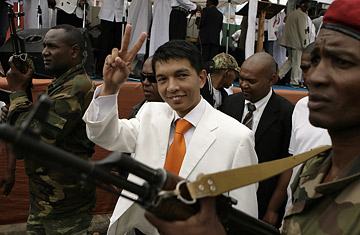
Madagascar's opposition leader Andry Rajoelina greets his supporters at the end of a religious service at Antananarivo's city centre
In its animated Hollywood incarnation, the Indian Ocean island of Madagascar is a natural paradise whose white sand beaches surround a lush tropical jungle populated by lemurs. And the Dreamworks picture of Madagascar's natural wonders is largely borne out by reality. It's the humans that are the problem.
Since late January, Madagascar has been convulsed by a power struggle between the President Marc Ravalomanana, 59, and opposition leader Andry Rajoelina, 34. Clashes between supporters of the two men have cost at least 135 lives. On Monday, the army — which had not taken sides — declared itself for Rajoelina and drove its tanks into the presidential palace and the reserve bank in the capital Antananarivo. Ravalomanana remained hunkered down in a second palace, on the outskirts of the city. "The palace is occupied. This was our mission for today. For now, we have no more orders," an army colonel, who declined to be named, told Reuters inside the palace complex. (See pictures of Madagascar's remarkable wildlife.)
The conflict between Ravalomanana and Rajoelina is not over policy nor political philosophy; it's a straight-forward tussle for the influence, prestige and money that comes with the top job. That's a fight is of a type that has become depressingly familiar to Madagascans since they won independence from France in 1960. The last 49 years have been marked by coups, corruption, fixed elections and political repression. Ravalomanana is a self-made millionaire who began his dairy giant as a roadside yogurt vendor and later formed his own political party called, simply, I Love Madagascar. He took charge after a small civil war with his predecessor, Didier Ratsiraka, who himself had taken power in a 1975 military coup. But once he was in office, Madagascans began to doubt the depth of Ravalomanana's professed ardor for the country. He largely failed to lift living standards in one of the world's poorest nations, where 70% of the people live on $2 a day or less. And his purchase of a $60 million jet with government money last year seemed to suggest a one-sided relationship more about what Madagascar could do for him rather than what he could do for it. ("What Madagascar Needs is a Mascot.")
Anger at Ravalomanana's performance in power explains why the tide is turning in favor of Rajoelina. The mayor of Antananarivo is also rich, a former disc jockey and the self-made owner of a Madagascan media empire, and that success has also given him an ego as large as Ravalomanana's. But he is from a new generation. Although he was elected mayor of the capital in 2007, under Madagascar's law, he is still six years too young to become President. And it is his youth, in a country where the average age is 17, that seems to be the basis of his popularity. He even called his party Tanora malaGasy Vonona, which translates as "Determined Malagasy Youth." (Underscoring the idea that Rajoelina is a man in a hurry, the party's initials spell TGV, the acronym for France's high-speed train.)
Rajoelina's hasty determination has proved infectious. The immediate spark for his clash with Ravalomanana was the decision by the President to close Rajoelina's TV station, Viva, in December after it broadcast an interview with former President Ratsiraka. Since then, Rajoelina has persuaded several of Madagascar's key political leaders to join his alternative "administration" which he inaugurated in January when he announced that "since the president and the government have not taken their responsibilities, I therefore proclaim that I will run all national affairs as of today." On Monday, with the President holed up in his second presidential palace, Rajoelina held a rally at which he called on the army and police to arrest Ravalomanana "beause Andry Raojoelina is impatient to get into office."
It is far from clear that youthful impatience will grant Madagascar a better leader than those that have preceded him. Nor does it bode well for the future of Madagascan democracy that its self-proclaimed new leader apparently has little time for elections. In Madagascar 2, the second movie in the franchise, the animals escape the island. Looking at their politicians, human Madagascans could be forgiven for wanting to do the same.
